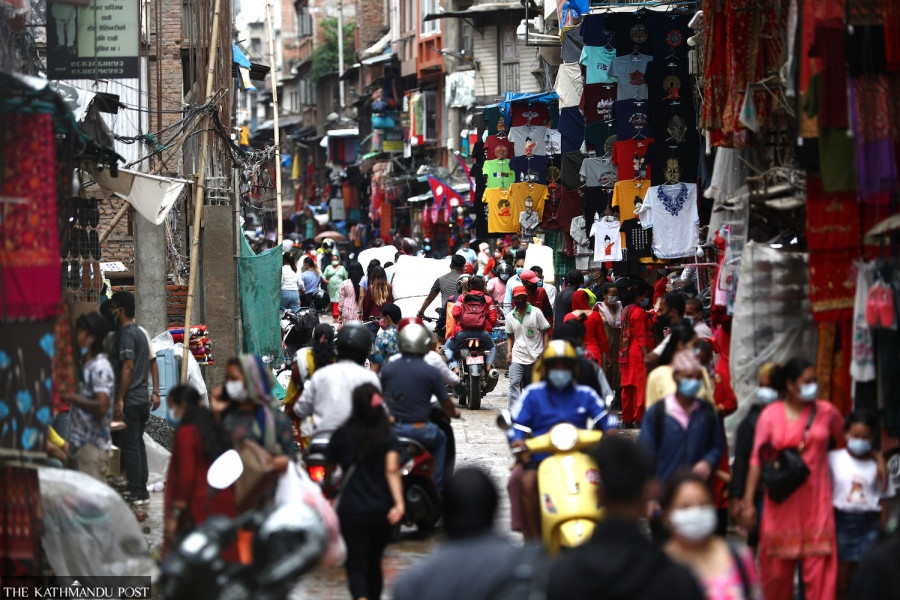Public health experts say the nighttime restrictions on vehicles are not enough because the virus does not distinguish between day and night.

Experts say the authorities should have focused the restrictions on over-crowded business districts or places that see big public gatherings. Sanjog Manandhar/TKP
A meeting of the three chief district officers of Kathmandu Valley on Tuesday decided to extend the existing Covid-19 prohibitory orders, which expire Thursday, for 12 days until August 24 with a new restriction on the movement of vehicles.
As per the announcement, all types of public and private vehicles except for those used in essential services have been banned from the roads after 8 pm starting Thursday in a bid to stem the spread of the coronavirus.
Public health experts, however, say the nighttime restrictions on non-essential vehicles are not enough because the virus does not distinguish between day and night.
“I don’t think the new decision will make any difference in virus spread,” said Dr Sher Bahadur Pun, chief of the Clinical Research Unit at Sukraraj Tropical and Infectious Disease Hospital at Teku.
“Because public mobility is high during daytime, the authorities should have focussed the restrictions on over-crowded business districts or places that see big public gatherings,” said Pun.
Authorities, however, defend their decision.
Kathmandu Chief District Officer Kali Parajuli said the main objective of banning public and private vehicles after 8pm is to discourage people from partying and eating out, a trend which has increased of late despite the banning restaurants from offering dine-in services.
“We were forced to impose the new restriction as people have been dining and partying at restaurants,” said Parajuli.
Dr Pun, however, said for virus transmission it does not matter whether it is day or night. “In the past few weeks very few restaurants have been opening at night, but if you go to any public places or business centers they are full of people,” said Pun.
The authorities have not restricted people’s movement or long-route public buses entering or exiting the Valley.
After the second wave hit the country, Kathmandu Valley was put under a strict lockdown for two months from April 29. On the day the prohibitory orders were announced, the country had registered 4,841 new cases with 35 Covid-19-related fatalities.
After a gradual decline in cases, authorities relaxed the curbs from mid-June.
In the past few weeks, Covid-19 cases have been rising steadily across the country.
On Tuesday, the country reported 4,904 new cases, of which 3,194 were from polymerase chain reaction (PCR) tests. These cases are the highest since the easing of the prohibitory orders in the Valley. The country reported 35 Covid-related deaths on Tuesday.
Dr Baburam Marasaini, former director at the Epidemiology and Disease Control Division, said the authorities introduced the new restrictions to control nighttime businesses and crowding. “They never make timely, reasonable or practical decisions,” said Marasaini.
Covid-19 cases have been gradually increasing over the past couple of weeks. On Monday, the country reported a total of 3,651 new cases, of which 2,609 were from polymerase chain reaction (PCR) tests.
Kathmandu Valley has been reporting around 1,000 new cases daily. On Tuesday, the Valley recorded 1,015 new infections. Of these, 624 cases were confirmed in Kathmandu, 152 in Lalitpur and 239 in Bhaktapur.
The District Administration Office, Kathmandu, last Tuesday, had published an ‘extremely important notice,’ urging the public and businesses houses to follow health safety protocols to prevent a possible third wave and warned that anyone found violating the prohibitory orders would face stringent punishment as per the law.
Kathmandu’s Chief District Officer Parajuli said in the past one week alone 35,000 people in Kathmandu were booked and fined for not wearing masks. The fines totalled Rs 3.5 million.
The notice also urged one and all not to organise protests, demonstrations, rallies and seminars so as to avoid crowding. Despite the notice, major business districts, sidewalks and vegetable markets continue to see huge crowds that do not observe the health safety protocols, especially social distancing.
A day after the Covid-19 death toll crossed the 10,000 mark, the government on Saturday started the Nepal Mask Campaign with the slogan, “I will wear a mask and encourage others to wear one too.”
To make this campaign successful, the Metropolitan Traffic Police Division has deployed 1,400 traffic police to check if people are wearing masks.
As per the extended prohibitory orders, public gatherings continue to remain banned and restaurants are allowed to operate until 7 pm and offer takeaway services only. Likewise, public vehicles operating until 8pm are not allowed to carry passengers beyond their seating capacities and educational institutions are not allowed to run in-person classes.












